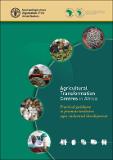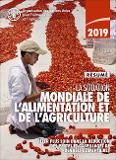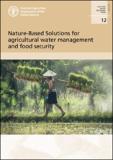Emerging from decades of war in 2002, Afghanistan and its rich agricultural history were in need of urgent repair and reinvigoration. Since that time, FAO has been operating in the country to rehabiliate irrigation infrastructure, build new dairy and wheat seed industries, improve livestock health, help smallholders diversify their crops and add higher-value produc...
Over the next ten years, the African rural space will be the theatre of profound changes as the activities envisaged for agricultural transformation are drastically scaled up. Increased food demand and changing consumption habits driven by demographic factors, such as population growth and urbanization, are already leading to a rapid increase of net food imports, o...



Aquatic genetic resources play a crucial role in contributing to global food security and nutrition, as well as to sustainable livelihoods. However, in various international fora, FAO Members have highlighted the limitations and constraints that they face in assessing their national capacities to use, manage and conserve such resources as well as in identifying and...

This publication looks at the implications of the societal changes that are transforming Asia and the Pacific. The region is experiencing major demographic shifts and urbanizing rapidly. E-agriculture technologies such as remote sensing, drones and sensors are emerging, with implications for the entire food system and management of the natural resource base. Struct...
Réduire les pertes et les gaspillages de denrées alimentaires est un impératif qui fait partie intégrante du Programme de développement durable à l’horizon 2030. De l’avis général, la réduction des pertes et gaspillages alimentaires peut contribuer de manière décisive à l’amélioration de la sécurité alimentaire et de la nutrition, à la promotion de la durabilité en...

Action contre la désertification est un projet qui soutient huit pays - Burkina Faso, Ethiopie, îles Fidji, Gambie, Haïti, Niger, Nigéria et Sénégal - dans la gestion durable et la restauration des terres dégradées. Le projet promeut une approche de restauration communautaire des terres tout au long de la filière (en partant de la graine à semer, jusqu'au produit f...
Legumes are important components of sustainable farming systems. They are useful to diversify and intensify cropping systems; fix atmospheric nitrogen and improve soil health; act as rotation crops; increase and diversify smallholder incomes; and lower the carbon footprint, mitigating climate change. Legumes can therefore play a critical role in achieving the Susta...
Accessibility to clean and sufficient water resources for agriculture is key in feeding the steadily increasing world population in a sustainable manner. Nature-Based Solutions (NBS) offer a promising contribution to enhance availability and quality of water for productive purposes and human consumption, while simultaneously striving to preserve the integrity and i...

The Action Against Desertification project supports Burkina Faso, Ethiopia, Gambia, Niger, Nigeria, Senegal, Fiji and Haiti in the sustainable management and restoration of degraded land. The project promotes community-based restoration approaches along value chains - from the seed to the market - for several economically significant non-timber forest products. Som...

This meeting, held in Berlin, Germany, on 18-27 September 2018, reviewed pesticide use patterns and good agricultural practices, data on the chemistry and composition of the pesticides, and methods of analysis for pesticide residues and recommended maximum residue levels. The report also contains information on acceptable daily intakes and acute reference doses of...




